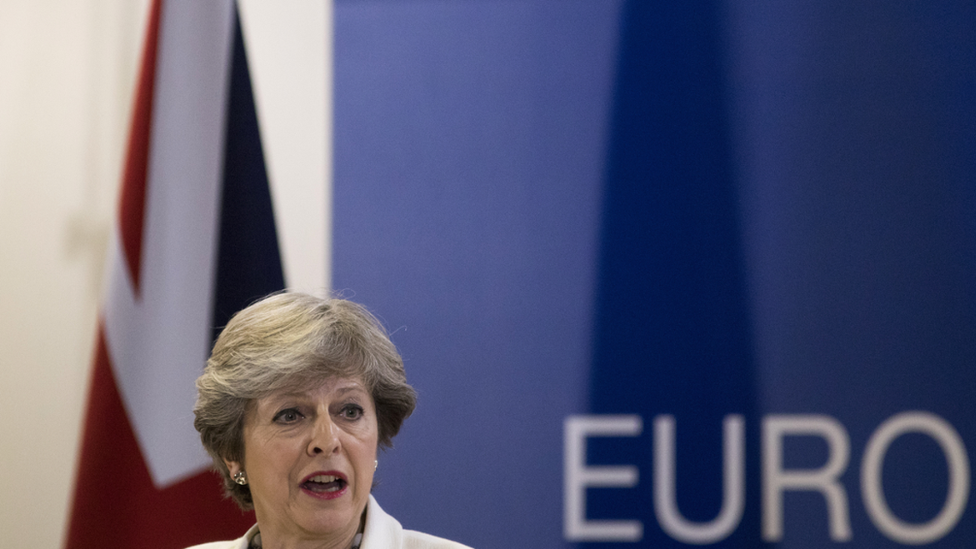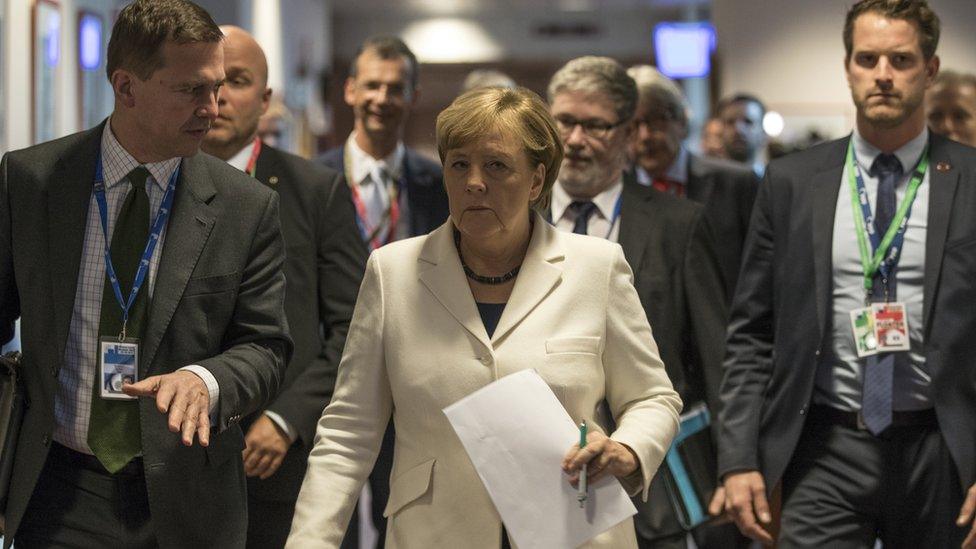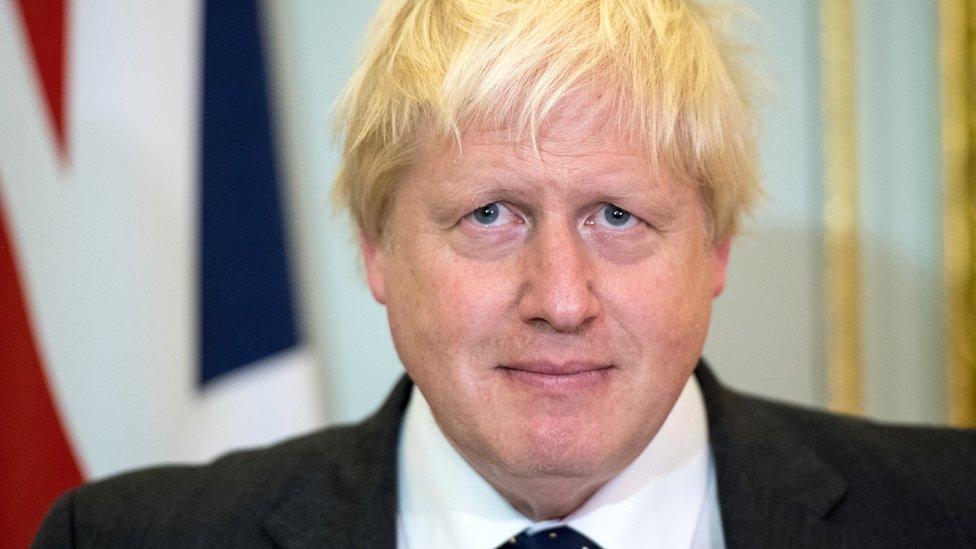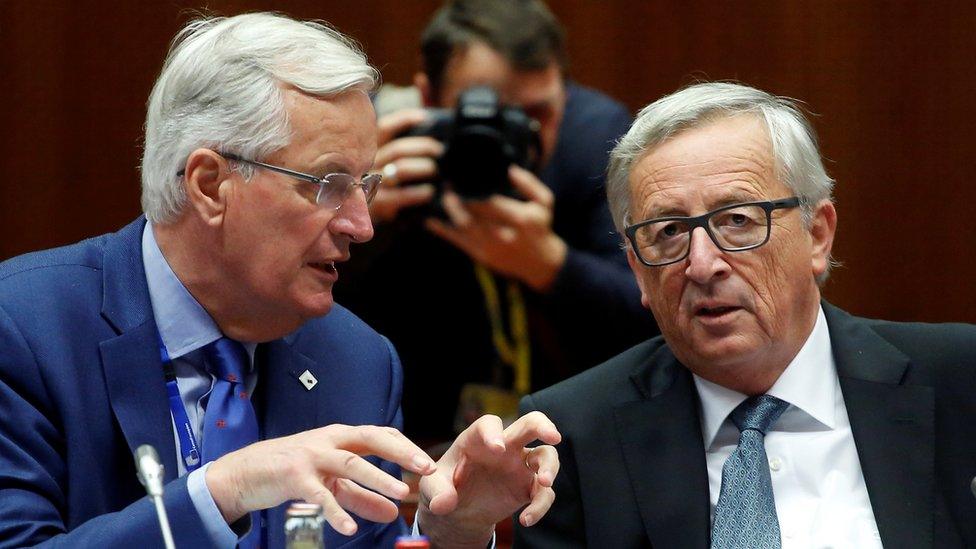Brexit viewed from Brussels (2): Negotiating for Beginners
- Published

Theresa May has found a different mood in Brussels
It's taken me a while, but last weekend was my first time in the Channel Tunnel.
For a quarter century, it's been a symbol of island Britain's physical and political connection to the continent.
Yet here I was, speeding through it en route to Brussels and on a mission to find out more about Britain's withdrawal from the European Union: pulling up the drawbridge, 'taking back control'.
Emerging into daylight at Calais, there are high fences to deter those desperate and determined to make it the other way, and around passport control. The land around the French tunnel entrance is sculpted by earthworks, as if a reminder as you hurtle through France's and Flanders fields that it was from trenches here that Europe's great powers were pounding artillery at each other a hundred years ago, to devastating effect.
Bruxelles bubble
In one quartier of Brussels, a few metro stops from the tourist attractions, the European project is not celebrated by memorials to those times but by imposing office blocks. Each time I come to Brussels, more are being built.
I have been coming here for over 20 years, on occasional forays to better understand deal-making in this centre of government, hoping to better explain it through my reporting.
If you're interested in politics, government and how you can build a giant market (and I admit that I am) it's a fascinating bubble occupied by 28 countries, a parliament, commission and council of ministers.
It can seem ridiculous with at least three presidents: undemocratic, where the Commission lacks accountability: lost in translation, with co-decision, qualified majorities, where a policy is an action, a meeting is an encounter, and the bubble-dwellers speak in the language of the Lisbon agenda, and the Bratislava roadmap.
However fascinating the bubble from inside, it's a big challenge for a journalist to explain to those outside. British journalists posted here have all found as much. It lacks pictures for television, the baying of set-piece debates, or dramatic, late-night votes.

Angela Merkel also has German domestic issues to trouble her
While reporters from other European countries file reports on the glacial grind towards consensus on seemingly obscure regulatory directives, Brits have taken refuge in the Old Hack's pub (it really is called that) next to the Berlaymont HQ of the Commission, sidelined by their news editors, embittered by the editorial priority given to Westminster.
Some, to their editors' delight in London, have embellished, distorted or simply invented Brussels attempts to codify and regulate. That includes the current Foreign Secretary when Boris Johnson was the Brussels scribbler for the Daily Telegraph. Thus we got the straight banana, and mythical bans on corgis, yoghurt, fire station poles and the Great British toaster.
Bye bye Brits
Arriving in Brussels this week, while the new offices keep going up, there's a sense that an era is ending. The British are leaving. Young Brits can't see a future here. Those with cross-border parentage are securing dual nationality.
Older hands see their careers blocked. One official tells me he feels like he's been locked in a cupboard. He's fallen off the memo circulation list of European colleagues.
I recall being in Brussels not long after the Brexit vote, and finding people who thought the British would find a way to reverse the decision. Now, I'm told, even if the British asked to get back in, they'd probably get a firm 'non', 'nein danke'.
The mood has changed. Not only are people a little hurt that their precious European club, project and identity has been rejected: some express relief that it will no longer be constrained by the drag-anchor of Britain's scepticism.
Yet the British have never been as unpopular in Brussels as they often assumed. For many, Britain's membership of the European Union brought pragmatism, good governance, and diplomatic heft in the wider world.
Northern Europeans looked to British leadership on opening markets. Eastern Europeans credit Britain with pushing hard, after communism's collapse, to bring them into the club.
And with such a high reputation, there's incredulity in this corner of Brussels that the Brits are exiting so ineptly.
Confidence in consensus
The challenge I set myself this week was to better understand the perspective of those on the other side of the negotiating table. The remaining members - the EU27 - have surprised even themselves by their unity of purpose: Brexit has firmed up their resolve to work together.
Leaving negotiations to Michel Barnier and forcing the British to explain how they think Brexit can work, they've avoided conflict between themselves. Since the shock of the Brexit vote, they've gained in confidence. The euro is stronger, refugee pressure abating, hard right populists seen off in Holland, France and Germany.
They're confident in their negotiating skill to build consensus. By contrast, Westminster political culture is not about negotiation, finding consensus or recognising that a deal is something that works for both sides.

Boris Johnson is no stranger to EU scare stories
Some wonder if there's a clever British plan to push Brexit talks to the edge of the cliff, in order to force European concessions, but increasingly, they see nothing clever about the British approach.
I'm told of attempts by British ministers and officials to go behind political battle lines and appeal to business interests in foreign capitals. This is in the hope that corporate interests will press government leaders to cut either special deals with the British, or at least some slack.
I'm also told that such attempts have been counter-productive. Even the oft-cited German car manufacturers have consistently said they see the interests of the EU's continuing single market as a higher priority than their large British market.
Boris's cake-eating
The view from the continent is that the British negotiators haven't done their homework about negotiation. The lessons: to be clear about your objective, to figure out what the other side wants, and what motivates it. Blowing raspberries from the battlements probably isn't going to work.
The Foreign Secretary's jolly jape about being in favour of both having his cake and also eating it is repeatedly quoted, and never in flattering terms. In France, it translates as having your butter and also the proceeds from selling it.
Everyone on the EU27 side that I asked about this made the same observation: the British have failed to recognise that the Union is a club built on laws and rules. It can't simply rip these up because one member demands it.
Once you understand those on the other side of the table, then consider where you'll have to compromise. In Britain's case, that requires leadership to prepare public opinion for a very big bill.
Theresa May didn't even acknowledge that possibility until the Florence speech, and she still can't mention a number. The one she's hinted at indirectly, £20bn, isn't even halfway there, according to the French president.
If they can get to the next phase of talks, about the future relationship across the North Sea, the 27 may find they too have their differences exposed. Those with strong UK trade links have the biggest interests in keeping supply chains unhindered. Others prioritise protection for their nationals in Britain.
They agree the UK should be given no concessions that leave it better off for having left the European club, but to differing extents.

The EU's chief Brexit negotiator Michel Barnier talks strategy with European Commission President Jean-Claude Juncker
And they have a lot of other things on their minds; domestic politics, immigration, economic growth, meddling and threat from Russia, future trade deals and the future of the euro.
Relations with Turkey took up far more time than Brexit at this week's summit. The Union is challenged by how much it can or should invervene in tensions over Catalonia, or the assassination of a Maltese journalist.
French journalists were more interested in the implications for farmers of trade talks with Mercosur, the South American trading bloc. Argentinian and Brazilian beef is more of a concern than les rosbifs. Mercosur has potential to be Europe's biggest trade deal yet.
One wise observer of European politics reckons Angela Merkel sees Brexit as a fourth order problem. She's got a coalition to pull together, and regional elections going badly.
While it consumes Westminster's and Whitehall's thinking and might involve up to £50bn, the German Chancellor is considering liability of euros by the trillion for EU-wide deposit insurance.
Le jaw jaw
The important thing to remember about Brussels is that for all its competing interests, for all its absurdities, inefficiency and unaccountability, it is a place to settle differences peacefully.
That's a contrast with a hundred years ago, and 75 years ago. The absence of war, one motivation for the European project that the British - confident about their national story of victory and measuring its interest in Europe by transactions and trade - have again failed to understand.
A version of this article was broadcast on the BBC's Good Morning Scotland programme on Saturday 21 October.You can listen here.